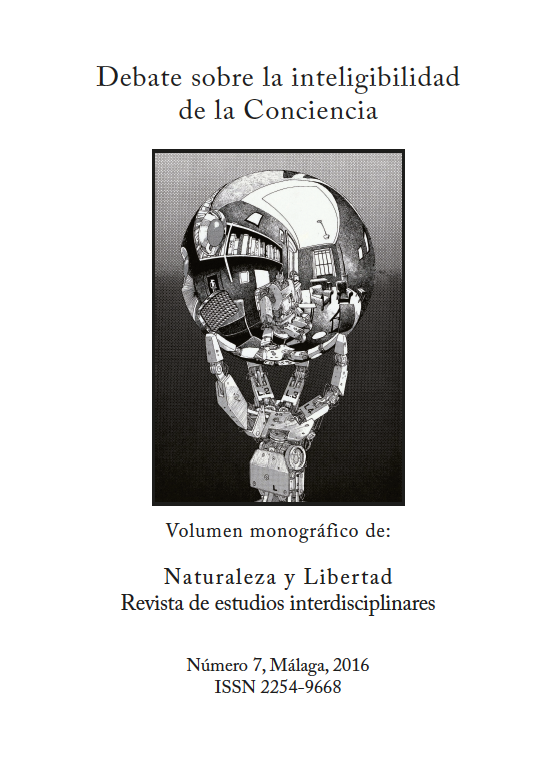Hay más ciencias que las naturales
DOI:
https://doi.org/10.24310/NATyLIB.2016.v0i7.6336Keywords:
conciencia, geometría, historiaAbstract
En este trabajo se contrapone a las explicaciones naturalistas de la conciencia las de otros tipos de saber; en concreto, los saberes más teóricos, como la filosofía, los saberes históricos y las ciencias formales, como la lógica y la matemática, en especial la geometría. Se aspira a mostrar con ello que la conciencia, inexplicada por las ciencias naturales, no por ello nos resulta desconocida.Downloads
Metrics
References
J. Arana, La conciencia inexplicada, Madrid, Biblioteca Nueva, 2015; 231 pp.
A. Comte, Discurso sobre el espíritu positivo, Madrid, Alianza, 1980; 136 pp.
G. Deleuze, Empirismo y subjetividad, Barcelona, Gedisa, 2007; 152 pp.
Habermas, Conocimiento e interés, Madrid, Taurus, 1982; 352 pp.
L. E. Palacios, Filosofía del saber, Madrid, Gredos, 1962; 400 pp.
L. Polo, Curso de teoría del conocimiento, v. II. Edición de las obras completas. Pamplona, Eunsa, 2016; 269 pp.
L. Polo, Curso de teoría del conocimiento, v. III, Pamplona, Eunsa, 1988; lección décima: 383-439.
L. Polo, “La Sollicitudo rei socialis: una encíclica sobre la situación actual de la humanidad”, en: F. Fernández (coord.): Estudios sobre la encíclica “Sollicitudo rei socialis”, Madrid, Unión editorial, 1990; pp. 63-119.
R. Saumells, La geometría euclídea como teoría del conocimiento, Madrid, Rialp, 1970; 228 pp.
F. Suárez, La historia y el método de investigación histórica, Madrid, Rialp, 1977; 257 pp.
Downloads
Published
How to Cite
Issue
Section
License
Those authors who have publications with this journal, accept the following terms:
1. Copyright and licensing information are clearly described on the journal’s web site: all content published in Naturaleza y Libertad is open acces without limit, and are subject to the Attribution-NonCommercial-ShareAlike 4.0 International (CC BY-NC-SA 4.0) license. The full text of which can be consulted at https://creativecommons.org/licenses/by-nc-sa/4.0/
2. It is the responsibility of the authors to obtain the necessary permissions for the images that are subject to copyright. The authors whose contributions are accepted for publication in this journal will retain the non-exclusive right to use their contributions for academic, research and educational purposes, including self-archiving or deposit in open access repositories of any kind. The electronic edition of this magazine is edited by the Editorial de la University of Malaga (UmaEditorial), being necessary to cite the origin in any partial or total reproduction.
3. This journal allows and encourages authors to publish papers on their personal websites or in institutional repositories, both before and after their publication in this journal, as long as they provide bibliographic information that accredits, if applicable, your posting on it.
4. In no case will anonymous papers be published.





18.png)













